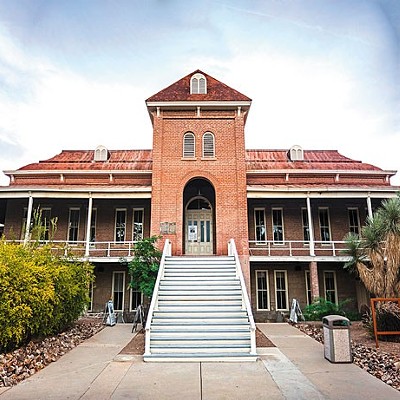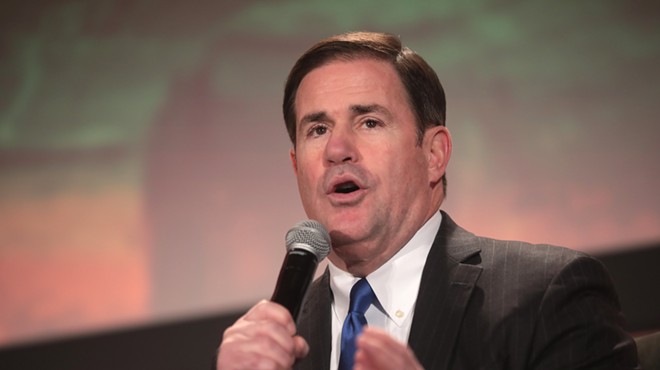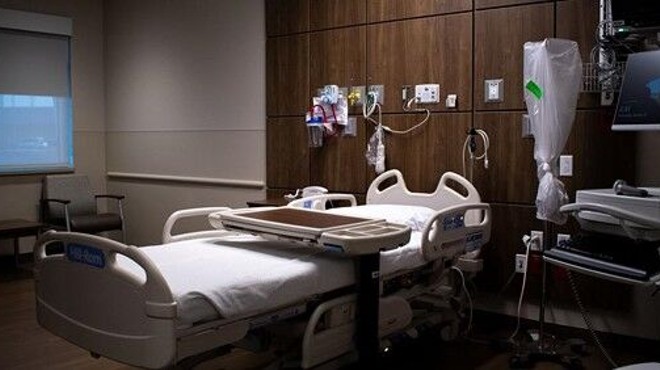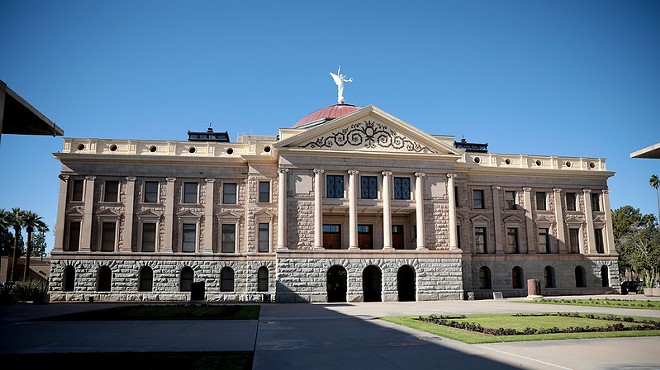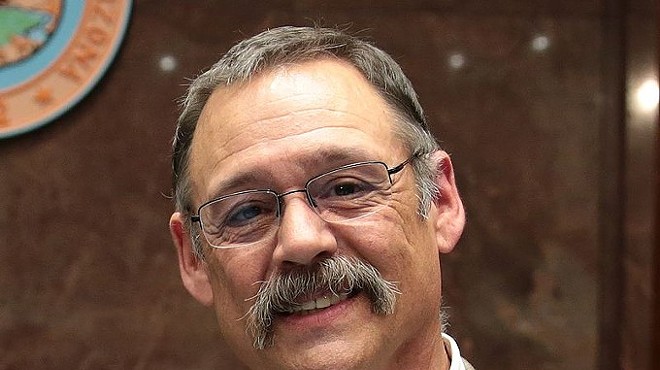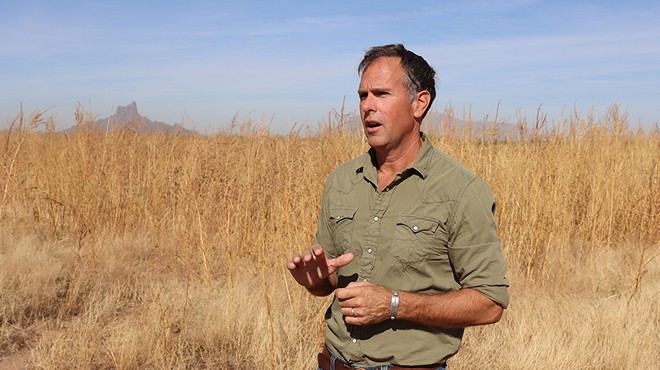Thursday, April 30, 2020
Your Southern AZ COVID-19 AM Roundup for Thursday, May 1: 7,600 Confirmed Cases in AZ; 320 Now Dead; You're Gonna Have To Stay Home Awhile Longer
The number of confirmed coronavirus cases in Arizona reached 7,648 as of Thursday, April 30, according to the morning report from the Arizona Department of Health Services.
Pima County had 1,241 confirmed cases.
The coronavirus had killed 320 people statewide, including 80 in Pima County, according to the report.
In Maricopa County, the number of confirmed COVID-19 cases had risen to 3,972.
Because testing remains limited in Arizona and COVID-19 symptoms can take as long as two weeks to appear after exposure to the virus (while some people can remain entirely asymptomatic), health officials continue to urge the public to avoid unnecessary trips and gatherings of more than 10 people and have advised people to cover their faces with masks in public.
Gov. Doug Ducey announced yesterday that his stay-at-home order would remain in place through May 15 with some modification. The order was set to expire today.
People are still advised to limit contact and many businesses must remain closed, but Ducey said he wanted the state’s economy to gradually reopen.
“These habits we've acquired over the last 45 days will not be with us forever, but they will be with us for the time being,” Ducey said.
Ducey said that he will decide how to move forward based on what future testing shows regarding the spread of the virus, but explained it would be a gradual reopening of businesses now closed.
The governor added that some businesses can voluntarily reopen beginning Monday, May 4, as long as they resume physical distancing. The first stage of opening includes appointment-based services, with more businesses included on Friday, May 8.
Ducey's decision won support from both Democrats and business leaders.
“The revisions put forth by the governor breathe needed oxygen into our retail sector," said Glenn Hamer, president and CEO Arizona Chamber of Commerce & Industry. "Stores that sell essential goods have proven already that they can operate safely, and we look forward to more retailers doing the same."
Pima County Supervisor Ramon Valadez, who earlier in the day urged Ducey to be cautious in relaxing restrictions, said Ducey appeared to be taking the right course of action by encouraging people to remain at home but allowing businesses to reopen on a limited basis.
“What he’s doing right now is OK,” Valadez said. “We need to go with science and data and public health so we’re not re-doing the reopening in another month, because that’s what we’re looking at if we don’t do that right.”
Valadez added that vulnerable populations such as seniors or people with underlying health issues avoid going out in public as much as they could.
But some Republican lawmakers called for Ducey end the stay-at-home order now.
Rep Kelly Townsend (R-Mesa) told Ducey via Twitter that “threatening my constituents with jail time is the last straw” and added that she “will be using all options to bring Arizona back into a Constitutional state.”
“I have requested a Concurrent Resolution to end the ‘state of emergency,’ so we can go back to work,” Townsend added. “The question is, will we have the votes?”
Lawmakers temporarily adjourned the session in March and have not returned to the Capitol since.
Ducey said that he working to allow restaurants to begin serving more than takeout and delivery later this month but bars would remain closed for a longer period.
Arizona Restaurant Association President and CEO Steve Chucri said he had been working with Ducey to develop ways to safely reopen eateries.
“We appreciate the governor’s thoughtful and inclusive approach," Chucri said in a prepared statement. "And though we are not ready to open today, by working together we will get there soon.”
Tucson Mayor Regina Romero said Ducey was moving in the right direction.
“I am encouraged by Governor Ducey’s extension of his ‘Stay Home, Stay Healthy, Stay Connected’ Executive Order and applaud his measured approach,” Romero said in a prepared statement. “These are difficult but necessary decisions that no elected official relishes making.”
But Romero cautioned against lifting the stay-at-home order before officials could demonstrate that Tucsonans are safe from COVID-19 in the workplace and the marketplace.
"Every day that our local businesses remain closed and our workers without jobs pains me,” Romero said. “I am as eager as anyone to begin gradually re-opening our economy, however we must do so in a manner that is safe and consistent with the advice of public health experts. It is critical that a phased-in re-opening follows the guidelines established by the CDC, and locally by the Pima County Health Department. To date, Arizona and Pima County have not met this criteria."
The stay-at-home order has closed a wide variety of “non-essential” businesses, including bars, barbershops, salons, theaters, gyms, swap meets and many retail stories. Restaurants may remain open but only for takeout and delivery service. Public parks remain open but amenities such as playgrounds and restrooms are closed.
.
Under the stay-at-home order, Arizonans are still able to shop for groceries, medical and household needs, and pet supplies. They can also go work, pick up a take-out meal from a restaurant, travel to take care of a family member, friend or pet, and can still go walking, hiking, biking and golfing, provided that they adhere to social distancing guidelines.
Ducey has been criticized by some Arizona conservatives for the stay-at-home order, but a late April poll by Public Opinion Strategies showed that most Arizonans approved of the effort to slow the outbreak. Roughly six in 10 voters thought his approach had been “just about right,” while 29 percent said he had “not gone far enough” and just 8 percent said he had “gone too far,” according to the poll of 600 registered voters.
Ducey had already announced that under certain circumstances, hospitals could return to performing elective surgeries, which had been put on hold over concern of a wave of COVID-19 cases overwhelming health care facilities. The ban on those elective surgeries had caused major financial losses for hospitals as they emptied rooms to prepare for a potential surge in COVID-19 cases that has not appeared.
Congress last week passed a new $493 billion relief package that included an additional $310 billion for the Paycheck Protection Program as well as $75 billion for hospitals facing the financial strain of the outbreak and $25 billion for additional testing capacity. The new portal for loans opened earlier this week and then crashed under the demand for service.
The first round of the Paycheck Protection Program, which ooffered $349 billion in forgivable loans as part of the $2.2 trillion COVID-19 relief package passed by Congress in response to the outbreak, ran out of money less than two weeks after it was launched. Many business owners complained that the loan process, run through banks by the Small Business Administration, was too complicated and filled with roadblocks.
The new federal relief package does not include additional aid to state and local governments struggling with a drop in tax revenues. While Democrats pushed for that funding to be included, it was opposed by Senate Majority Leader Mitch McConnell and other GOP leaders. McConnell said last week that it made more sense to allow states to go bankrupt rather than provide them with more federal funding, although he has since said that he might support such funding if Democrats agree to limit legal liability for businesses in relation to potential COVID-19 lawsuits.
Pima County Administrator Chuck Huckelberry said last week that he was assembling a task force that would develop strategies for reopening businesses. The Back to Business Task Force will include members of the county’s Small Business Commission along with representatives from restaurants, hotels and resorts, chambers of commerce, gyms, daycares, area attractions, film and live performance theaters and event centers.
“The purpose of the Task Force will be to establish a framework of hygiene and physical distancing standards that need to be developed to begin to reopen, in a limited, phased manner, the commercial and business activities that may have been suspended or substantially interrupted during this time,” Huckelberry wrote in a memorandum to the Board of Supervisors last week.
The outbreak has hammered Arizona's economy, with more than 400,000 people applying for unemployment in recent weeks. State budget forecasters warned lawmakers earlier this month that the state is facing a budget deficit of $1.1 billion in the next fiscal year, which begins in July. But they cautioned that the uncertainty surrounding the outbreak means they could be wrong by $500 million in either direction.
Tucson City Manager Mike Ortega has warned council members that the city was going to take a major financial hit, but said he didn’t have enough data to make an informed forecast as to the depth of it.
“We know there’s an iceberg ahead, but won’t know how large until probably mid-June,” said Ward 6 Councilmember Steve Kozachik. “We need to budget assuming the titanic and hope to be surprised.”
UA President Robert C. Robbins said last week during an appearance on Bill Buckmaster’s radio show that he didn’t see football games returning in the fall, although the university would resume face-to-face classes.
Robbins has warned that a return to normal life could months away—or longer. “Until there's a vaccine, we’re never going to be completely risk free,” Robbins said. “That’s probably a year at least before we would have a vaccine.”
Robbins also said that the UA was bracing for the possibility that many out-of-state and international students might not return to campus in the fall because of the outbreak, which could lead to financial calamity for the university as the bulk of the university’s tuition revenue comes from those students.
The UA has announced furloughs for all employees, along with other pay cuts for high-paid employees.
The University of Arizona is working to produce 250,000 tests for COVID-19 antibodies. Such tests could tell people if they have already been exposed to COVID-19, which is deadly to some patients while others remain asymptomatic. Testing for antibodies could identify people who are no longer at risk for catching COVID-19, although there have been reports of people coming down with the disease after beating it once.
Ducey said the state would use the tests healthcare workers and first responders, while Robbins plans to use them to test students, faculty and staff at the university.
Those first phase of those tests, which will include 3,000 samples, will begin in Pima County this Thursday, April 30.
Visitors from areas with major community spread of COVID-19—New York, New Jersey and Connecticut under the current restrictions—must still enter quarantine for two weeks if they come to Arizona, under an executive order issued by Ducey.
Ducey also is requiring staff at nursing homes and similar facilities now have to wear personal protective equipment and institute symptom checks for anyone entering the building. In addition, residents must be provided with a video device to communicate with the outside world, according to an executive order.
Ducey has also said hospitals and healthcare workers, who are concerned about a shortfall in personal protective equipment, are required to track data related to COVID-19 such as available hospital beds, the number of patients visiting emergency rooms with COVID-19 symptoms and the use of ventilators and personal protective equipment.
With schools now closed through the end of the academic year, teachers have transitioned to online learning and districts across the region are delivering lunch and breakfast meals to kids via school buses or setting up central locations.
In the face of the spreading virus, Ducey has also halted residential, business and nonprofit evictions; loosened regulations to make telemedicine more available and increased eligibility for AHCCCS, the state's Medicaid program; and activated the National Guard to assist at grocery stores and food banks.
COVID-19 symptoms typically occur two to 14 days after exposure, and include headache, fever, cough, and shortness of breath, according to the CDC. However, some cases of the virus are entirely asymptomatic. Practices to avoid infection include social distancing (of at least six feet), washing your hands, avoiding unnecessary trips and not touching your face. COVID-19 can survive on cardboard for up to 24 hours, and on stainless steel and plastic surfaces up to three days.
If you think you have been exposed to COVID-19 and develop a fever, cough or difficulty breathing, speak with a healthcare provider for medical advice. According to the CDC, people who are mildly ill with COVID-19 are able to recover at home. Stay at home and avoid public transportation, but stay in touch with your doctor. If you do leave your home, wear a facemask and clean your hands often. If you develop more severe symptoms (persistent pain or pressure in the chest, confusion, bluish lips) get medical attention immediately. Your local health authorities will give instructions on checking your symptoms and reporting information.
Have you caught COVID-19? Are you feeling ill? Is your small business struggling to make it? Have you lost your job as a result of the outbreak? Are you struggling to manage your kids while schools are closed? Tell us your COVID-19 stories. Send an email or photo to tucsoneditor@tucsonlocalmedia.com.
Pima County had 1,241 confirmed cases.
The coronavirus had killed 320 people statewide, including 80 in Pima County, according to the report.
In Maricopa County, the number of confirmed COVID-19 cases had risen to 3,972.
Because testing remains limited in Arizona and COVID-19 symptoms can take as long as two weeks to appear after exposure to the virus (while some people can remain entirely asymptomatic), health officials continue to urge the public to avoid unnecessary trips and gatherings of more than 10 people and have advised people to cover their faces with masks in public.
Gov. Doug Ducey announced yesterday that his stay-at-home order would remain in place through May 15 with some modification. The order was set to expire today.
People are still advised to limit contact and many businesses must remain closed, but Ducey said he wanted the state’s economy to gradually reopen.
“These habits we've acquired over the last 45 days will not be with us forever, but they will be with us for the time being,” Ducey said.
Ducey said that he will decide how to move forward based on what future testing shows regarding the spread of the virus, but explained it would be a gradual reopening of businesses now closed.
The governor added that some businesses can voluntarily reopen beginning Monday, May 4, as long as they resume physical distancing. The first stage of opening includes appointment-based services, with more businesses included on Friday, May 8.
Ducey's decision won support from both Democrats and business leaders.
“The revisions put forth by the governor breathe needed oxygen into our retail sector," said Glenn Hamer, president and CEO Arizona Chamber of Commerce & Industry. "Stores that sell essential goods have proven already that they can operate safely, and we look forward to more retailers doing the same."
Pima County Supervisor Ramon Valadez, who earlier in the day urged Ducey to be cautious in relaxing restrictions, said Ducey appeared to be taking the right course of action by encouraging people to remain at home but allowing businesses to reopen on a limited basis.
“What he’s doing right now is OK,” Valadez said. “We need to go with science and data and public health so we’re not re-doing the reopening in another month, because that’s what we’re looking at if we don’t do that right.”
Valadez added that vulnerable populations such as seniors or people with underlying health issues avoid going out in public as much as they could.
But some Republican lawmakers called for Ducey end the stay-at-home order now.
Rep Kelly Townsend (R-Mesa) told Ducey via Twitter that “threatening my constituents with jail time is the last straw” and added that she “will be using all options to bring Arizona back into a Constitutional state.”
“I have requested a Concurrent Resolution to end the ‘state of emergency,’ so we can go back to work,” Townsend added. “The question is, will we have the votes?”
Lawmakers temporarily adjourned the session in March and have not returned to the Capitol since.
Ducey said that he working to allow restaurants to begin serving more than takeout and delivery later this month but bars would remain closed for a longer period.
Arizona Restaurant Association President and CEO Steve Chucri said he had been working with Ducey to develop ways to safely reopen eateries.
“We appreciate the governor’s thoughtful and inclusive approach," Chucri said in a prepared statement. "And though we are not ready to open today, by working together we will get there soon.”
Tucson Mayor Regina Romero said Ducey was moving in the right direction.
“I am encouraged by Governor Ducey’s extension of his ‘Stay Home, Stay Healthy, Stay Connected’ Executive Order and applaud his measured approach,” Romero said in a prepared statement. “These are difficult but necessary decisions that no elected official relishes making.”
But Romero cautioned against lifting the stay-at-home order before officials could demonstrate that Tucsonans are safe from COVID-19 in the workplace and the marketplace.
"Every day that our local businesses remain closed and our workers without jobs pains me,” Romero said. “I am as eager as anyone to begin gradually re-opening our economy, however we must do so in a manner that is safe and consistent with the advice of public health experts. It is critical that a phased-in re-opening follows the guidelines established by the CDC, and locally by the Pima County Health Department. To date, Arizona and Pima County have not met this criteria."
The stay-at-home order has closed a wide variety of “non-essential” businesses, including bars, barbershops, salons, theaters, gyms, swap meets and many retail stories. Restaurants may remain open but only for takeout and delivery service. Public parks remain open but amenities such as playgrounds and restrooms are closed.
.
Under the stay-at-home order, Arizonans are still able to shop for groceries, medical and household needs, and pet supplies. They can also go work, pick up a take-out meal from a restaurant, travel to take care of a family member, friend or pet, and can still go walking, hiking, biking and golfing, provided that they adhere to social distancing guidelines.
Ducey has been criticized by some Arizona conservatives for the stay-at-home order, but a late April poll by Public Opinion Strategies showed that most Arizonans approved of the effort to slow the outbreak. Roughly six in 10 voters thought his approach had been “just about right,” while 29 percent said he had “not gone far enough” and just 8 percent said he had “gone too far,” according to the poll of 600 registered voters.
Ducey had already announced that under certain circumstances, hospitals could return to performing elective surgeries, which had been put on hold over concern of a wave of COVID-19 cases overwhelming health care facilities. The ban on those elective surgeries had caused major financial losses for hospitals as they emptied rooms to prepare for a potential surge in COVID-19 cases that has not appeared.
Congress last week passed a new $493 billion relief package that included an additional $310 billion for the Paycheck Protection Program as well as $75 billion for hospitals facing the financial strain of the outbreak and $25 billion for additional testing capacity. The new portal for loans opened earlier this week and then crashed under the demand for service.
The first round of the Paycheck Protection Program, which ooffered $349 billion in forgivable loans as part of the $2.2 trillion COVID-19 relief package passed by Congress in response to the outbreak, ran out of money less than two weeks after it was launched. Many business owners complained that the loan process, run through banks by the Small Business Administration, was too complicated and filled with roadblocks.
The new federal relief package does not include additional aid to state and local governments struggling with a drop in tax revenues. While Democrats pushed for that funding to be included, it was opposed by Senate Majority Leader Mitch McConnell and other GOP leaders. McConnell said last week that it made more sense to allow states to go bankrupt rather than provide them with more federal funding, although he has since said that he might support such funding if Democrats agree to limit legal liability for businesses in relation to potential COVID-19 lawsuits.
Pima County Administrator Chuck Huckelberry said last week that he was assembling a task force that would develop strategies for reopening businesses. The Back to Business Task Force will include members of the county’s Small Business Commission along with representatives from restaurants, hotels and resorts, chambers of commerce, gyms, daycares, area attractions, film and live performance theaters and event centers.
“The purpose of the Task Force will be to establish a framework of hygiene and physical distancing standards that need to be developed to begin to reopen, in a limited, phased manner, the commercial and business activities that may have been suspended or substantially interrupted during this time,” Huckelberry wrote in a memorandum to the Board of Supervisors last week.
The outbreak has hammered Arizona's economy, with more than 400,000 people applying for unemployment in recent weeks. State budget forecasters warned lawmakers earlier this month that the state is facing a budget deficit of $1.1 billion in the next fiscal year, which begins in July. But they cautioned that the uncertainty surrounding the outbreak means they could be wrong by $500 million in either direction.
Tucson City Manager Mike Ortega has warned council members that the city was going to take a major financial hit, but said he didn’t have enough data to make an informed forecast as to the depth of it.
“We know there’s an iceberg ahead, but won’t know how large until probably mid-June,” said Ward 6 Councilmember Steve Kozachik. “We need to budget assuming the titanic and hope to be surprised.”
UA President Robert C. Robbins said last week during an appearance on Bill Buckmaster’s radio show that he didn’t see football games returning in the fall, although the university would resume face-to-face classes.
Robbins has warned that a return to normal life could months away—or longer. “Until there's a vaccine, we’re never going to be completely risk free,” Robbins said. “That’s probably a year at least before we would have a vaccine.”
Robbins also said that the UA was bracing for the possibility that many out-of-state and international students might not return to campus in the fall because of the outbreak, which could lead to financial calamity for the university as the bulk of the university’s tuition revenue comes from those students.
The UA has announced furloughs for all employees, along with other pay cuts for high-paid employees.
The University of Arizona is working to produce 250,000 tests for COVID-19 antibodies. Such tests could tell people if they have already been exposed to COVID-19, which is deadly to some patients while others remain asymptomatic. Testing for antibodies could identify people who are no longer at risk for catching COVID-19, although there have been reports of people coming down with the disease after beating it once.
Ducey said the state would use the tests healthcare workers and first responders, while Robbins plans to use them to test students, faculty and staff at the university.
Those first phase of those tests, which will include 3,000 samples, will begin in Pima County this Thursday, April 30.
Visitors from areas with major community spread of COVID-19—New York, New Jersey and Connecticut under the current restrictions—must still enter quarantine for two weeks if they come to Arizona, under an executive order issued by Ducey.
Ducey also is requiring staff at nursing homes and similar facilities now have to wear personal protective equipment and institute symptom checks for anyone entering the building. In addition, residents must be provided with a video device to communicate with the outside world, according to an executive order.
Ducey has also said hospitals and healthcare workers, who are concerned about a shortfall in personal protective equipment, are required to track data related to COVID-19 such as available hospital beds, the number of patients visiting emergency rooms with COVID-19 symptoms and the use of ventilators and personal protective equipment.
With schools now closed through the end of the academic year, teachers have transitioned to online learning and districts across the region are delivering lunch and breakfast meals to kids via school buses or setting up central locations.
In the face of the spreading virus, Ducey has also halted residential, business and nonprofit evictions; loosened regulations to make telemedicine more available and increased eligibility for AHCCCS, the state's Medicaid program; and activated the National Guard to assist at grocery stores and food banks.
COVID-19 symptoms typically occur two to 14 days after exposure, and include headache, fever, cough, and shortness of breath, according to the CDC. However, some cases of the virus are entirely asymptomatic. Practices to avoid infection include social distancing (of at least six feet), washing your hands, avoiding unnecessary trips and not touching your face. COVID-19 can survive on cardboard for up to 24 hours, and on stainless steel and plastic surfaces up to three days.
If you think you have been exposed to COVID-19 and develop a fever, cough or difficulty breathing, speak with a healthcare provider for medical advice. According to the CDC, people who are mildly ill with COVID-19 are able to recover at home. Stay at home and avoid public transportation, but stay in touch with your doctor. If you do leave your home, wear a facemask and clean your hands often. If you develop more severe symptoms (persistent pain or pressure in the chest, confusion, bluish lips) get medical attention immediately. Your local health authorities will give instructions on checking your symptoms and reporting information.
Have you caught COVID-19? Are you feeling ill? Is your small business struggling to make it? Have you lost your job as a result of the outbreak? Are you struggling to manage your kids while schools are closed? Tell us your COVID-19 stories. Send an email or photo to tucsoneditor@tucsonlocalmedia.com.




